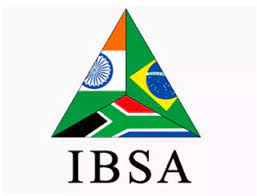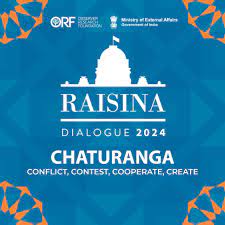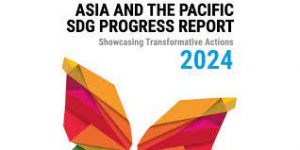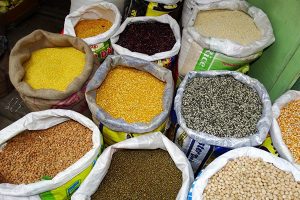Today’s Current Affairs: 22nd Feb 2024 for UPSC IAS exams, State PSC exams, SSC CGL, State SSC, RRB, Railways, Banking Exam & IBPS, etc
Table of Contents
IBSA Fund : India Contribution

India has contributed USD 1 million to a fund established by India, Brazil and South Africa.
- IBSA Fund was established in 2004 and became operational in 2006.
- The IBSA countries – India, Brazil and South Africa – each contribute one million dollars annually to the Fund in a spirit of partnership and support for Southern-led, demand-driven, transformational projects in developing countries.
- The purpose of the fund is to identify replicable and scalable projects that can be disseminated to developing countries on a demand-driven basis.
- IBSA Fund-supported projects help partner countries in the Global South to achieve their national priorities, as well as all other internationally agreed development goals.
- It includes promoting food security, addressing HIV/AIDS, and extending access to safe drinking water all to contribute to the achievement of the Sustainable Development Goals, the release said.
IBSA:
- It is a unique Forum which brings together India, Brazil and South Africa, three large democracies and major economies from three different continents, facing similar challenges.
- The grouping was formalised and named the IBSA Dialogue Forum when the Foreign Ministers of the three countries met in Brasilia on 6 June 2003 and issued the Brasilia Declaration
Ban On Sale And Production Of Cotton Candy:

The Tamil Nadu government banned the sale and production of cotton candy in the state after it was found that the chemical Rhodamine-B was being used for making it.
- Rhodamine-B is a water-soluble chemical compound.
- While it appears green in powder form, it turns vivid fluorescent pink when it comes in contact with water.
- It is a chemical commonly used for dyeing in the textile, paper, leather, and paint industries as a colouring agent that helps in attaining the red and pink spectrum.
- “As per the Food Safety Standards Act, 2006, preparation, packaging, importing, selling and serving food items with Rhodamine-B in wedding ceremonies and other public events is a punishable offence.
- It is an industrial dye which is not allowed in food anywhere in the world as it is toxic.
- Researchers have identified that if food containing this chemical is consumed regularly, it can cause damage to the cerebellum tissue in the brain and to the brainstem that connects the brain to the spinal cord.
- These damages can lead to functional abnormalities and can hinder human motor functioning.
- The chemical is toxic to humans and can cause oxidative stress on cells and tissues if ingested.
- It becomes particularly hazardous when it is mixed with food products, leading to cancer and tumours over time.
Raisina Dialogue : 9th Edition

The ninth edition of the Raisina Dialogue will be held from February 21 to 23rd in New Delhi.
- Raisina Dialogue is an annual conference on geopolitics and geoeconomics, which aims to address the most challenging issues faced by the world.
- It is held annually since 2016 in New Delhi.
- The conference is attended by people from political, business, media, and civil society backgrounds.
- The Dialogue is structured as a multi-stakeholder, cross-sectoral discussion, involving heads of state, cabinet ministers and local government officials, who are joined by thought leaders from the private sector, media and academia.
- It is organised by the Observer Research Foundation (ORF) in partnership with the Ministry of External Affairs, Government of India.
- The theme of the 2024 edition is “Chaturanga: Conflict, Contest, Cooperate, Create,”
Global Initiative On Digital Health:

Achieving one of the three priority areas agreed upon during India’s G20 presidency in 2023, the World Health Organization (WHO) recently launched the Global Initiative on Digital Health (GIDH) virtually.
- Global Initiative on Digital Health (GIDH) is a WHO-managed network aiming to amplify and align resources toward country-led digital health transformation through strengthened collaboration and knowledge exchange.
- It is a platform for sharing knowledge and digital products among countries.
- The initiative aims to achieve the following objectives through collaborative efforts:
- Assess and prioritise the country’s needs for sustainable digital health transformation.
- Increase the alignment of country-level digital health resources and unfunded priorities.
- Support the accelerated achievement of the strategic objectives of the Global Strategy on Digital Health 2020-2025.
- Build capacity and converge efforts to encourage local development, maintenance, and adaptation of digital health technologies to continuously changing needs.
Asia And The Pacific SDG Progress Report 2024:

The United Nations Economic and Social Commission for Asia and the Pacific (UNESCAP) published the Asia and the Pacific SDG Progress Report 2024.
- This report focuses on success stories, trends, and the distinct challenges encountered in various parts of the region in striving towards the SDGs.
- The Asia and the Pacific SDG Progress Report is one of the annual flagship publications of the United Nations ESCAP.
- It provides an overview of SDG Progress in the region which serves as a foundation for many other activities conducted by ESCAP and its partners.
- It draws out the priorities for enhancing data availability on SDG indicators, especially for the most vulnerable population groups, which could help shape more equitable and inclusive development strategies.
Key Highlights of the Report:
- Progress on the 17 Sustainable Development Goals (SDGs) remains uneven and inadequate across various segments of the population and within the five subregions of Asia and the Pacific.
- At the current pace, the region will not achieve all SDGs until 2062, which marks a significant 32-year delay from the target year of 2030.
- Only 11% of the 116 measurable SDG targets are on track. By 2030, the region is projected to achieve only one-third of the required progress if the current trajectory continues.
- Progress on SDG 13 (Climate Action) remains critically behind, with all SDG 13 targets either stalled or reversing, highlighting the urgent need to incorporate climate action into national policies and strengthen resilience to cope with climate-related disasters.
Cervical Cancer : Experts View

Experts have raised the need to conduct more screening test to detect cervical cancer among women along with vaccine drive for girls.
- Union Finance Minister Nirmala Sitharaman announced during the presentation of the interim Budget that the government plans to encourage vaccination against cervical cancer for girls aged nine to 14.
- Cervical Cancer is a disease in which cells in the body grow out of control.
- Cancer is always named for the part of the body where it starts, even if it spreads to other body parts later.
- Cervical cancer is a growth of cells that starts in the cervix.
- The cervix is the lower part of the uterus that connects to the vagina.
- Various strains of the human papillomavirus, also called HPV, play a role in causing most cervical cancers.
- HPV is a common infection that’s passed through sexual contact.
- When exposed to HPV, the body’s immune system typically prevents the virus from doing harm. In a small percentage of people, however, the virus survives for years.
- This contributes to the process that causes some cervical cells to become cancer cells.
- It is the second leading cause of cancer-related deaths among women in India (over 77,000 annually), and is estimated to be the second most frequent cancer among Indian women between 15 and 44 years.
Maritime Transport 2023 : Review

The United Nations Conference on Trade and Development (UNCTAD) has released the Review of Maritime Transport 2023, highlighting the Issue of Greenhouse Gas (GHG) Emissions from International Shipping and Challenges in Decarbonization.
Highlights of the Review:
- GHG emissions from international shipping were 20% higher in 2023 compared to a decade ago.
- The shipping industry contributes to over 80% of the world’s trade volume and nearly 3% of global GHG emissions.
- Containerized trade is expected to grow by 1.2% in 2023 and further by 3% between 2024-2028.
- Oil and gas trade volumes showed robust growth in 2022.
- Early in January 2023, commercial ships were on average 22.2 years old and more than half of the world’s fleet was over 15 years old.
- As the average age of the world fleet is increasing, it raises concern that alternative fuels are not yet available at scale and are more costly, and the ships that can use them are also more costly than traditional ships.
- 8% of the global fleet uses conventional fuels like heavy fuel oil, light fuel oil, and diesel/gas oil.
- Only 1.2% are using alternative fuels, mainly LNG, LPG, methanol, and to a lesser extent, battery/hybrid. However, progress is underway as 21 % of vessels currently on order are designed to run on alternative fuels, notably LNG, LPG, battery/hybrid, and methanol.
- Decarbonizing the world’s fleet by 2050 could require annual investments ranging from USD 8 billion to USD 90 billion. Full decarbonization could double yearly fuel costs, necessitating a just transition for the sector.
Vaibhav Scheme : 75 Indian Diaspora Scientists Return To India

75 Indian Diaspora Scientists to return to India under Government’s Vaibhav Scheme.
- The first group of 22 fellows has already been chosen to the scheme meant to attract Indian-origin scientists based abroad for short-term collaboration with Indian institutions.
- Twenty-two scientists, mostly based at North American and European institutes including the California Institute of Technology, the University of Oxford, the University of Michigan, the University of Geneva, the University of Waterloo, Canada, and the University of Oslo, will spend anywhere from a month or two annually, for a maximum of three years, at host Indian institutes.
- The Vaishwik Bhartiya Vaigyanik (VAIBHAV) Fellowship is a program implemented by the Department of Science & Technology, Ministry of Science and Technology, Government of India.
- The program aims to foster collaboration between scientists of the Indian Diaspora and Indian Higher Educational Institutions (HEIs), Universities, and/or Public Funded Scientific Institutions.
Global Pulses Conference:

Global Pulses Conference (GPC) urges India to augment production of pulses to meet nutritional requirements.
- The Global Pulse Conference 2024 was recently held in New Delhi.
- India is aiming to achieve self-sufficiency in pulses by 2027, focusing on expanding cultivation and supplying new varieties of seeds.
- Global Pulses Conference represents all segments of the pulse industry value chain from growers, researchers, logistics suppliers, traders, exporters and importers to government bodies, multilateral organisations, processors, canners and consumers.
- Its membership includes 24 national associations and over 500 private sector members.
- India is the largest producer (25% of global production), consumer (27% of world consumption) and importer (14%) of pulses in the world.
- Pulses account for around 20% of the area under food grains and contribute around 7-10% of the total foodgrains production in the country.
- Top Pulses Producing States: Madhya Pradesh, Maharashtra, Rajasthan, Uttar Pradesh and Karnataka.




